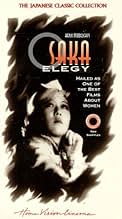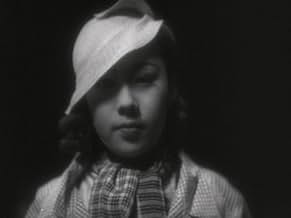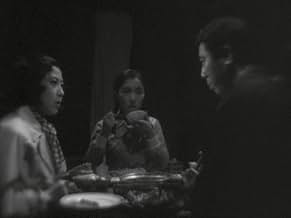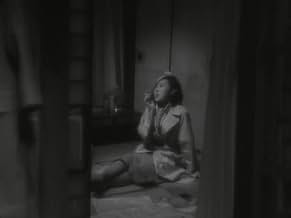IMDb-BEWERTUNG
7,2/10
2743
IHRE BEWERTUNG
Eine junge Frau wird zur Herrin Ihres Chefs, um Ihre Familie zu unterstützen.Eine junge Frau wird zur Herrin Ihres Chefs, um Ihre Familie zu unterstützen.Eine junge Frau wird zur Herrin Ihres Chefs, um Ihre Familie zu unterstützen.
Empfohlene Bewertungen
An exceptional film in that it redefines that cinematic, to a degree literary, trope, the femme-fatal. In this film we watch from her perspective. Her transgressions seem themselves a kind of victimization. Not only is sexuality the only tool a woman is given to empower herself in society, but her dignity and her sexuality are therefor put in an antagonistic relation to each other. Sexuality and sincerity become mutually exclusive in the world Mizoguchi paints. The cinematography is magnificent. Everyone looks compromised. But the last shot lets us know which victim's compromise cuts the deepest and. A feminist work in the most profound sense.
10Gonzo-23
It was this film alone that drove me into an intense obsession with cinema. Mizoguchi is the great Japanese master, and Osaka Elegy reveals his genius. From his long take compositions that are taxed with complexity and tension, to his ambigious depictions of character, I felt like I had grown after I had seen this film. Notice the national allegory at the film's conclusion, a confused and lonely Japan. And his inconclusive final shot taken many years before the well known 400 Blows. The devastating melodrama is not undercut by any cinematic manipulation. I highly recommend this to any lover of the cinematic medium. Also, I am a sucker for self-reflexive Kabuki theater sequences...
This is the first collaboration between Mizoguchi and writer Yoshikata Yoda, with the actress Isuzu Yamada in the principal role, as a young telephonist pushed to prostitution to save her ruined family, and then repudiated by them. Mizoguchi begins his impressive mastership with the framing and the perspective and, though still far from his masterpieces, is an interesting milestone for the Mizoguchi admirers.
There are so many interesting things going on in this film, and several of them surprised me. I loved Ayake (played by Isuzu Yamada) and the voices of the women in general. I couldn't help but contrast Ayake's headstrong will and fierceness to Yasujiro Ozu's Noriko in Tokyo Story (played by Setsuko Hara). Noriko was the perfect picture of traditional grace and dedication in a Japanese woman and she fit in perfectly with Ozu's straight lines and symmetrical framing. Ayake, on the other hand, is shadowed by an almost conspiratorial camera which cleverly spies on the fore and background simultaneously, and creeps behind walls and curtains to follow the characters and listen in on their conversations, amplifying the sense of daring and defiance of Ayake's character. The inventiveness of so many varying shots stole my attention more than anything else, though I also appreciated the quick and steady pacing of the story as it unfolded, predominantly led by Ayake.
http://funkyforestfirstcontact.wordpress.com/i-just-saw/
http://funkyforestfirstcontact.wordpress.com/i-just-saw/
The first film included in the Criterion Collewction's "Mizoguchi's Fallen Women", this is the story of Ayako (a pretty great Isuzu Yamada who, according to this website, is still wonderfully with us), who is a switchboard operator who needs 300 yen to prevent her father getting in major trouble. To get the money, she spends time with her boss. This is, of course, little more than being a companion. One of Mizoguchi's gifts as a director (he also wrote the story) is that in many of his films his characters were not sympathetic yet he does not wholly judge the. The key is, what would you do? The film could never be in color, it is a noirish, gray film. The story is compelling, the acting is uniformly good, with Ms. Yamada really standing out, and the direction is, of course, flawless. I've also seen "Sisters Of The Gion" and "Streets Of Shame" from this collection. Buy it! Mizoguchi was one of the giants of 20th century cinema from any country. This film is highly recommended.
Wusstest du schon
- Zitate
Junzo Murai: You're a woman... Being taken to the police station... Getting thrown into jail... You've done shameful things. You ungrateful child!
Ayako Murai: How could you say that? I never expected that I'd be treated like this when I came home. This is ridiculous! I thought you would welcome me with open arms. If I'd have known this, I never would have come back.
Top-Auswahl
Melde dich zum Bewerten an und greife auf die Watchlist für personalisierte Empfehlungen zu.
- How long is Osaka Elegy?Powered by Alexa
Details
- Laufzeit
- 1 Std. 11 Min.(71 min)
- Farbe
- Sound-Mix
- Seitenverhältnis
- 1.37 : 1
Zu dieser Seite beitragen
Bearbeitung vorschlagen oder fehlenden Inhalt hinzufügen























